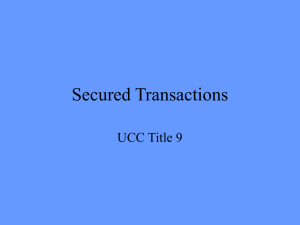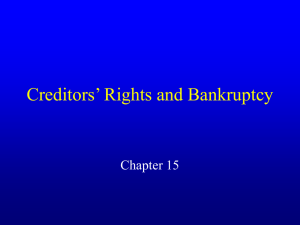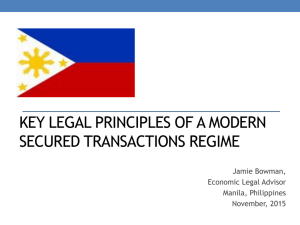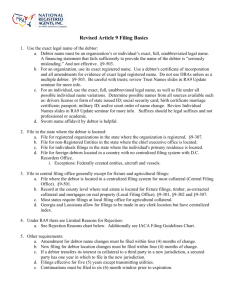PPSA Enforcement
advertisement
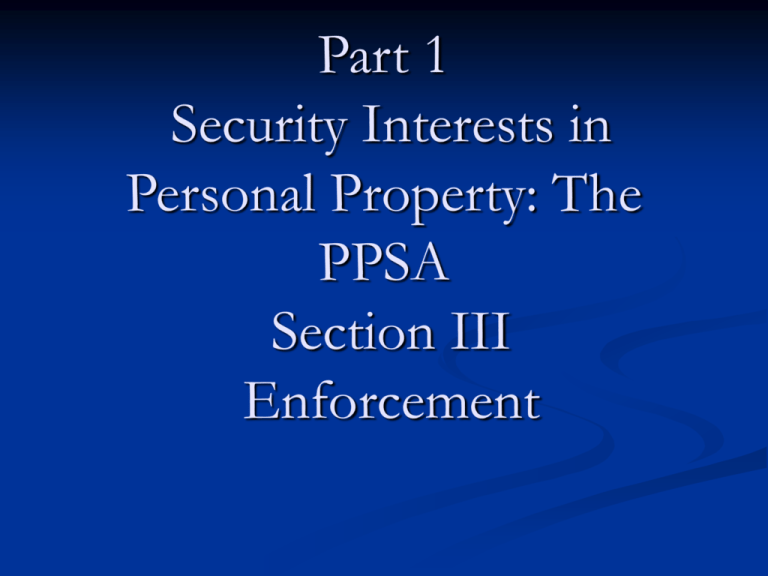
Part 1 Security Interests in Personal Property: The PPSA Section III Enforcement Outline SP rights Rights against collateral Enforcement options set out in Part V of PPSA Rights on the debt Deficiency action Same rights as any unsecured creditor if SP so chooses Outline Debtor rights Right of redemption Right of reinstatement Right to surplus Exemptions Introduction – S.55 55(1) This Part does not apply to (a) a transaction referred to in subsection 3(2), or Deemed security interests – treated as security interests only for priority purposes Introduction – S.55 55(1) This Part does not apply to (b) a transaction between a pledgor and a pawnbroker. Regulated by common law Less stringent requirements than PPSA Less regulation thought to facilitate law value credit transactions More ‘consumer protection’ drives up cost of debt proportionately more in low value loans Introduction – S.55 55(3) The rights and remedies in this Part are cumulative. Exercising one right does not exclude the others Introduction – S.55 55(8) A security interest does not merge merely because a secured party has reduced the claim to judgment. A secured creditor has both a debt claim and a security interest The SP may sue on the debt, as if it were an unsecured creditor, and doing so does not extinguish its security interest Secured Party Rights– s.56 56(2) Subject to subsection (4), if the debtor is in default under a security agreement, the secured party has against the debtor only (a) the rights and remedies provided in the security agreement, (b) the rights and remedies provided in this Part and sections 36, 37 and 38 [fixtures, crops and accessions], and (c) when in possession of the collateral, the rights and remedies provided in section 17 [rights of SP in possession]. No common law remedies Only contract (2)(a) and statutory (2)(b),(c) remedies Debtor Rights – S.56 56(3) Subject to subsection (4), if the debtor is in default under a security agreement, the debtor has against the secured party (a) the rights and remedies provided in the security agreement, (b) the rights and remedies provided by any other Act or rule of law not inconsistent with this Act, and (c) the rights and remedies provided in this Part and in section 17. Contract & statutory rights Plus rights given under any other Act unless inconsistent with PPSA Main example – extended notice period prior to enforcement under the BIA Waiver of Debtor Rights 56(4) Except as provided in sections 17, 59, 60 and 62, no provision of section 17 or sections 57 to 66, to the extent that the provision gives rights and remedies to the debtor or imposes obligations on the secured party, can be waived or varied by agreement or otherwise. Statutory debtor rights cannot be waived Waiver of SP Obligations 66(7) Except as otherwise provided in this Act, a provision in a security agreement or any other agreement is void if it purports to exclude an obligation or an onus imposed by this Act or purports to limit the liability of or the amount of damages recoverable from a person who has failed to discharge an obligation imposed by this Act. Statutory SP obligations cannot be waived Rights of the Secured Party: Enforcement SP Enforcement Options Right to possession of collateral Preliminary to disposal Right to dispose of collateral and apply proceeds to debt Right to sue on deficiency Right to retain collateral in satisfaction of debt Excludes right to sue on deficiency Corresponds to traditional remedy of foreclosure Right to collect on intangibles Right appoint a receiver Possession 58(2) Subject to [exemptions, notice periods and special rules wrt collateral which is difficult to separately possess, e.g. fixtures], if the debtor is in default under a security agreement, (a) the secured party has, unless otherwise agreed, the right to take possession of the collateral or otherwise enforce the security interest by any method permitted by law, Possession Under prior law the right to possession depended on the form of the security device Automatic under a mortgage Required express contractual provision under a conditional law Substance over form under the PPSA Method of Repossession “by any method permitted by law” Self-help, but not if it will provoke a breach of the peace Otherwise, method used for recovery of possession of one’s own property (e.g. Rule 44 in N.B.) Possession – Notice Obligations 58(2) Subject to . . . any other Act or rule of law requiring a secured party to give prior notice of the intention to enforce a security interest Possession – Notice Obligations “...rule of law...” Possession by SP brings D’s business to a halt Common law developed a notice obligation See Ronald Elwyn Lister v Ltd v Dunlop Canada [1982] 1 SCR 726 Notice obligation is preserved by s.58(2) “rule of law” SP must give reasonable notice of the intention to take possession “Reasonable” depends on circumstances Possession – Notice Obligations “...other Act...” BIA S.244 also imposes notice obligation 10 days notice before seizing. . . . . .substantially all. . . . . .inventory, accounts receivable or other property Foreclosure Traditional remedy – Not a remedy under the PPSA Under the purely legal form of mortgage, collateral vests in mortgagee automatically on default by D Foreclosure Modified by equity to protect debtor: D has right to “redeem” property even after default “Equity of redemption” Mortgagee has correlative right to “foreclose” equity of redemption Exercise of right of foreclosure vests collateral in mortgagee Protracted Uncertain (can be reopened) Foreclosure Foreclosure was not satisfactory Protracted and expensive Uncertain (can be reopened) Contractual right of sale was implemented Accepted by the courts and legislatures Disposal - Right 59(2) After seizing or repossessing the collateral, a secured party may dispose of it in its existing condition or after repair, processing or preparation for disposition. Basic right to sell collateral to satisfy debt. . . Disposal – Proceeds 59(3) The proceeds of the disposition of collateral shall be applied consecutively to (a) the reasonable expenses of seizing, repossessing, holding, repairing, processing or preparing for disposition and disposing of the collateral and any other reasonable expenses incurred by the secured party, and (b) the satisfaction of the obligations secured by the security interest of the party making the disposition. . . .and apply proceeds to debt Disposal – Surplus 60(2) If . . . the secured party has . . .disposed of [the collateral], the secured party shall. . . pay any surplus in the following order to (a) [subordinate SPs with perfected security interest] (b) [JC with registered notice of judgment] (c) [parties who have given written notice of their interest] (d) [the debtor] “...in the following order...” is poor drafting Should read “...in order of their priority...” Disposal – Surplus/Deficiency Sale price/method of sale is very important to debtor and other subordinate interest holders 60(6) Unless otherwise agreed, or unless otherwise provided in this or any other Act, the debtor is liable to pay any deficiency to the secured party. Disposal – Method: Notice 59(8) Not less than twenty days before disposition of the collateral, the secured party shall give a notice to (a) the debtor and any other person who is known by the secured party to be an owner of the collateral, (b) [subordinate SPs with perfected security interest] (c) [JC with registered notice of judgment] (d) [parties who have given written notice of their interest] Must give notice to known parties whose interests are affected: why? Recall – Possession prior to disposal, notice prior to possession Disposal – Method: Notice Notice allows subordinate parties to monitor sale 66(5) In an action for a deficiency, the debtor may raise as a defence the failure of the secured party to comply with obligations in section 17, 18, 59 or 60, but non-compliance shall limit the right to the deficiency only to the extent that it has affected the debtor's ability to protect the debtor's interest in the collateral or has made the accurate determination of the deficiency impracticable. Allowing for the exercise of the right of redemption is, as a practical matter, secondary Disposal – Method 59(5) Collateral may be disposed of (a) by private sale, (b) by public sale, including public auction or closed tender, (c) as a whole or in commercial units or parts, or (d) if the security agreement so provides, by lease. Flexibility in method of disposal But subject to requirement of commercial reasonableness: s.65 The statutory notice requirement does not exhaust SP’s responsibility Disposal – Method Supplementary law and duties of good faith and commercial reasonableness 65(2) All rights and obligations arising under a security agreement, under this Act or under any other applicable law shall be exercised and discharged in good faith and in a commercially reasonable manner Action for damages for breach of this duty: s.66(2) Disposal – Method Net effect – SP has duty to take reasonable steps to secure fair market price Method of disposal must be appropriate to the goods and the market Disposal – Method Failure to comply with the duty of commercial reasonableness gives rise to an action for damages 66(2) If a person fails, without reasonable excuse, to discharge any obligations imposed on the person by this Act, the person to whom the obligation is owed has a right to recover loss or damage that was reasonably foreseeable as liable to result from the failure. Disposal – Method Failure to comply with the notice does not disentitle the SP from seeking a deficiency Does not give any proprietary remedy against the property Disposal – Method The harm from failure to give notice may include inability to assess the value of the collateral or monitor the sale But the deficiency action is still not prohibited Disposal – Method 66(5) In an action for a deficiency, the debtor may raise as a defence the failure of the secured party to comply with obligations in section 17, 18, 59 or 60, but non-compliance shall limit the right to the deficiency only to the extent that it has affected the debtor's ability to protect the debtor's interest in the collateral or has made the accurate determination of the deficiency impracticable. Disposal – Method In the case of consumer goods, deemed damages apply 66(3) If a secured party fails, without reasonable excuse, to comply with obligations (b) in section 17, 18, 59, 60 or 61 and the collateral is consumer goods, the debtor . . .shall be deemed to have suffered damages not less than the amount prescribed. But the SP can still pursue a deficiency Disposal – Method Compare the PPSA with New Brunswick land law In NB land law the statutory notice requirement does exhaust the seller’s responsibility There is no duty (except on banks) to exercise reasonable care to secure a fair market price Is there any justification for the NB land law rule? Disposal – Method 59(14) The secured party may purchase the collateral or any part of it but only at public sale, including public auction or closed tender, and only for a price that bears a reasonable relationship to the market value of the collateral. Disposal – Method In real estate law in most jurisdictions, SP is prohibited at common law from buying in for their own benefit Why? Why should personal property be different? Disposal – Effect 59(15) If a secured party disposes of collateral to a purchaser for value and in good faith who takes possession of it, the purchaser acquires the collateral, whether or not the requirements of this section have been complied with by the secured party, free from (a) the interest of the debtor, (b) an interest subordinate to that of the debtor, (c) an interest subordinate to that of the secured party, and all obligations secured by the subordinate interests shall be deemed to be performed for the purposes of sections 49 and 50. Purchaser take clear of all subordinate interests Disposal – Effect 59(15). . .whether or not the requirements of this section have been complied with by the secured party. . . Purchaser take clear of all subordinate interests even if sale was improper Why? Retain in Satisfaction Right to retain collateral in satisfaction of debt 61(1) After default, the secured party may propose to take the collateral in satisfaction of the obligation secured by it and shall give notice of the proposal to [the debtor and known subordinate interest holders] Person who is given notice may object (to SP): s.61(2),(3) In which case SP must sell collateral Except that SP may object to objection (to court): s.61(7), to deter frivolous objections Retain in Satisfaction “...in satisfaction of the debt...” 61(4) If no notice of objection is given under subsection (2), the secured party (a) shall be deemed, on the expiry of the fifteen day period or periods referred to in subsection (2), to have irrevocably elected to take the collateral in satisfaction of the obligation secured by it, and [can then sell the collateral free of all subordinate interests] No right to sue for any deficiency Why not? Right to Collect on Intangibles 57(2) If the debtor is in default under a security agreement, the secured party is entitled (a) to notify a debtor on an intangible or chattel paper or an obligor on an instrument or security to make payment to the secured party whether or not the assignor was making collections on the collateral before the notification, (b) [and apply the money to the debt]... Enforcement by notification Right to Collect on Intangibles Notice 57(3) A secured party who enforces a security by giving notice in accordance with paragraph (2)(a) shall notify the debtor within fifteen days after doing so. Right to Collect on Intangibles Notice 41(7) If collateral which is either an intangible or chattel paper is assigned, the account debtor may make payments to the assignor (a) before the account debtor receives notice of the assignment in accordance with subsection (8), or (b) after the account debtor receives notice of the assignment if the account debtor requests the assignee to furnish proof of the assignment and the assignee fails to furnish proof within fifteen days after the request. Right to Collect on Intangibles 41(9) Payment by an account debtor to an assignee after the account debtor receives notice of the assignment in accordance with subsection (8) discharges the obligation of the account debtor to the extent of the payment. Right to sue on the Deficiency Some jurisdictions (e.g. Alberta, California) prohibit deficiency actions against individual mortgagors of real property Should SP have the right to sue on the deficiency? Is there any reason why land and personal property should be treated differently? Is there any reason why individual mortgagors of real property should be treated differently from businesses? Right to Appoint a Receiver Receiver operates the business as a going concern Wears “two hats” Agent of the debtor Agent of the SP More detail in Part 3.II Rights of the Debtor Right of Redemption Any time before final disposal... any subordinate interest holder... may redeem... unless otherwise agreed after default... by paying the debt... plus expenses of seizing and preparing for disposition. Right of Redemption 62(2) At any time before the secured party has disposed of the collateral or contracted for its disposition under section 59, or before the secured party is deemed to have irrevocably elected to retain the collateral under section 61,.. The right of redemption is exercised after default Notice periods before SP disposal allow opportunity to redeem Right of Redemption 62(2) . . .any person entitled to receive a notice of disposition under subsection 59(8) or (11) may redeem the collateral. . . Subordinate interest holders may redeem The same persons whose interests will be extinguished by disposition Redemption does not extinguish junior interests It merely pays off the senior secured party Right of Redemption The party redeeming is subrogated to the rights of the party whose interest is redeemed The right of subrogation is not express in the PPSA, but is due to the preservation of existing consistent law: s.65(1) Right of Redemption Under prior law, a subordinate secured party could redeem a senior security interest only if the debtor was also in default under its own security agreement This appears to be reversed by s.62(2) But the point is usually moot as subordinate security interests almost invariably provide that a default under the senior interest is a default under the junior interest Right of Redemption - Example SP1 has first priority for $5,000; SP2 has second priority for $20,000; value of collateral is $22,000; D default on loan from SP1; SP1 seeks to dispose of collateral To redeem, SP2 must pay $5,000 to SP1 SP2 has right to redeem even if D did not default on loan from SP2 SP2 is then subrogated to the rights of SP1 Ie SP2 now has a first security interest for $5,000 and has the right to sue D for the $5,000 owing; and SP2 has a second security interest for $20,000 Right of Redemption Why would SP2 want to redeem in the previous example? If it does not exercise its right of redemption (and neither does D), SP1 will sell the collateral for $22,000, apply $5,000 to its debt, and turn over $17,000 to SP2, for a deficiency of $3,000 If SP2 redeems, it will have total debt of $25,000. SP2 then sells the collateral for $22,000, for a deficiency of $3,000 The bottom line is the same in either case, so why would SP2 want to redeem? Right of Redemption Now suppose D tries to exercise its right of redemption 62(3) If more than one person elects to redeem under subsection (2), the priority of their rights to redeem is the same as the priority of their respective interests. Right of Redemption If SP1 faces conflicting requests, SP2 has first right to redeem But what if D gets there first and redeems? The formal answer is not clear (Under prior law, you could only redeem the party immediately above you in priority, so the problem did not arise) But as a practical matter, D gets no advantage, as SP2's interest is not extinguished Right of Redemption 62(2) . . .unless that person has otherwise agreed in writing after default. . . Right of redemption cannot be waived before default: see s.56(4) In particular, it cannot be waived in the security agreement itself Right of redemption can be waived after default Why? Right of Redemption 62(2) . . . by tendering fulfillment of the obligations secured by the security interest, together with a sum equal to the reasonable expenses referred to in paragraph 59(3)(a) to the extent that such expenses have actually been incurred by the secured party. Redeem by payment of debt plus reasonable expenses of realizing on collateral actually incurred Acceleration Security agreements which provide for repayment by periodic installments (e.g. a standard house mortgage) inevitably provide that if any payment is missed (or if there is any other default under the agreement, e.g. failure to keep the collateral insured) the entire debt immediately becomes due. This is known as an “acceleration clause” Reinstatement A right of reinstatement provides from relief against acceleration Reinstatement 62(4) At any time before the secured party has disposed of the collateral . . . , or before the secured party is deemed to have irrevocably elected to retain the collateral under section 61, the debtor. . .may reinstate the security agreement. . .by (a) paying the sum actually in arrears, exclusive of the operation of an acceleration clause in the security agreement, . . . Reinstatement And (b) curing any other default by reason of which the secured party intends to dispose of the collateral, and (c) paying a sum equal to the reasonable expenses referred to in paragraph 59(3)(a) to the extent that such expenses have actually been incurred by the secured party. Reinstatement “Redemption” and “reinstatement” both start with “re” but they are completely separate rights The right of reinstatement applies only to relieve againt an acceleration clause The right of reinstatement is meaningless if there is no acceleration clause in the security agreement Reinstatement The right of redemption is a universal feature of secured lending law The right of reinstatement is not Generally a right of reinstatement is a feature of the PPSA is not found in land law was not found in prior personal property law Reinstatement Except, Ontario (& most U.S. states) Ontario does have a right of reinstatement in land law In the Ontario PPSA the right of reinstatement applies only to consumer goods Reinstatement 62(4) “. . .unless the debtor has otherwise agreed in writing after default. . .” Like the right or redemption, the right of reinstatement can be waived after default, but not before Reinstatement 62(1) In subsection (2) [but not subsection (4)] "secured party" includes a receiver. 62(4) At any time before the secured party has disposed of the collateral or contracted for its disposition under section 59, or before the secured party is deemed to have irrevocably elected to retain the collateral under section 61... The right of reinstatement cannot be exercised after the appointment of a receiver. Reinstatement 62(5) Unless otherwise agreed, the debtor is not entitled to reinstate a security agreement (a) more than twice, [if agreement is <1 year], or (b) more than twice each year, if the security agreement provides for payment by the debtor during a period of time of more than one year after value was given by the secured party. Protections against the abuse of the right of reinstatement Reinstatement Is the right of reinstatement a good idea from the debtor’s perspective? Conversely, is an acceleration clause a bad idea, from the debtor’s perspective Ask the question at the time the security agreement is entered into “Ex ante” as opposed to “ex post” Exemptions 58(3) Subject to subsection (7), a debtor may claim the following items of collateral to be exempt from seizure by a secured party: (a) furniture, household furnishings and appliances used by the debtor or a dependent to a realizable value of five thousand dollars or to any greater amount that may be prescribed; Exemptions (b) one motor vehicle having a realizable value of not more than six thousand five hundred dollars at the time the claim for exemption is made, or not more than any greater amount that may be prescribed, if the motor vehicle is required by the debtor in the course of or to retain employment or in the course of and necessary to the debtor's trade, profession or occupation or for transportation to a place of employment where public transportation facilities are not reasonably available; Exemptions (c) medical or health aids necessary to enable the debtor or a dependent to work or to sustain health; and (d) consumer goods in the possession and use of the debtor or a dependent if, on application, the Court determines that (i) the loss of the consumer goods would cause serious hardship to the debtor or dependent, or (ii) the costs of seizing and selling the goods would be disproportionate to the value that would be realized. Exemptions Exception to the exemptions 58(7) Paragraphs (3)(a) to (c) and subsections (4), (5) and (6) do not apply in relation to goods that are subject to a purchase money security interest held by the secured party against whom the claim to exemption is made. Exemption cannot be claimed when the money lent was used to purchase the collateral itself. Exemptions Exemptions are unique to Atlantic PPSAs Are exemptions a good idea?
